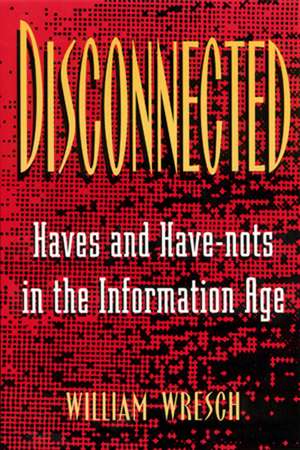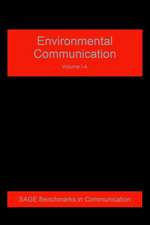Disconnected: Haves and Have-Nots in the Information Age
Autor William Wreschen Limba Engleză Paperback – noi 1996
In the Information Age, information is power. Who produces all that information, how does it move around, who uses it, to what ends, and under what constraints? Who gets that power? And what happens to the people who have no access to it?
Disconnected begins with a striking vignette of two men: One is the thriving manager of a company selling personal computers and computer services. The other is just one among thousands of starving laborers. He has no way to find the information that might help him find a job, he cannot afford newspapers, rarely sees television, cannot understand the dialect of local radio broadcasts, will probably never touch a computer. These two men happen to live in Windhoek, Namibia, but this is not a story about Africa––it is a story that could be repeated almost anywhere in the world, even next door.
With vivid anecdotes and data, William Wresch contrasts the opportunities of the information-rich with the limited prospects of the information-poor. Surveying the range of information––personal, public, organizational, commercial––that has become the currency of exchange in today’s world, he shows how each represents a form of power. He analyzes the barriers that keep people information-poor: geography, tyranny, illiteracy, psychological blinders, “noise,” crime. Technology alone, he demonstrates, is not the answer. Even the technology-rich do not always get access to important information––or recognize its value.
Wresch spells out the grim consequences of information inequity for individuals and society. Yet he ends with reasons for optimism and stories of people who are working to pull down the impediments to the flow of information.
Disconnected begins with a striking vignette of two men: One is the thriving manager of a company selling personal computers and computer services. The other is just one among thousands of starving laborers. He has no way to find the information that might help him find a job, he cannot afford newspapers, rarely sees television, cannot understand the dialect of local radio broadcasts, will probably never touch a computer. These two men happen to live in Windhoek, Namibia, but this is not a story about Africa––it is a story that could be repeated almost anywhere in the world, even next door.
With vivid anecdotes and data, William Wresch contrasts the opportunities of the information-rich with the limited prospects of the information-poor. Surveying the range of information––personal, public, organizational, commercial––that has become the currency of exchange in today’s world, he shows how each represents a form of power. He analyzes the barriers that keep people information-poor: geography, tyranny, illiteracy, psychological blinders, “noise,” crime. Technology alone, he demonstrates, is not the answer. Even the technology-rich do not always get access to important information––or recognize its value.
Wresch spells out the grim consequences of information inequity for individuals and society. Yet he ends with reasons for optimism and stories of people who are working to pull down the impediments to the flow of information.
Preț: 292.47 lei
Nou
Puncte Express: 439
Preț estimativ în valută:
55.96€ • 58.43$ • 46.32£
55.96€ • 58.43$ • 46.32£
Carte tipărită la comandă
Livrare economică 05-19 aprilie
Preluare comenzi: 021 569.72.76
Specificații
ISBN-13: 9780813523705
ISBN-10: 0813523702
Pagini: 288
Dimensiuni: 152 x 229 x 15 mm
Greutate: 0.46 kg
Ediția:None
Editura: Rutgers University Press
Colecția Rutgers University Press
ISBN-10: 0813523702
Pagini: 288
Dimensiuni: 152 x 229 x 15 mm
Greutate: 0.46 kg
Ediția:None
Editura: Rutgers University Press
Colecția Rutgers University Press
Notă biografică
WILLIAM WRESCH chairs the computing and mathematics department at the University of Wisconsin, Stevens Point. He has published five books and software on using computers to teach effective writing. His experience as a Fulbright Fellow helping the new University of Namibia design its computer curriculum sparked this book. His essay on Africa and the Internet appeared in Internet World.
Cuprins
Preface
Information Rich, Information Poor
Part I. Problems at the Source
Chapter 1. World Media
Chapter 2. Personal Information
Chapter 3. Organizational Information
Chapter 4. Professional Information
Chapter 5. Commercial Information
Part II. Transmission Problems
Chapter 6. Information Exiles
Chapter 7. Tyranny
Chapter 8. Information Criminals
Part III. Reception Problems
Chapter 9. World Education
Chapter 10. Psychology
Chapter 11. Noise
Part IV. Solutions
Chapter 12. Reasons for Hope
References
Index
Information Rich, Information Poor
Part I. Problems at the Source
Chapter 1. World Media
Chapter 2. Personal Information
Chapter 3. Organizational Information
Chapter 4. Professional Information
Chapter 5. Commercial Information
Part II. Transmission Problems
Chapter 6. Information Exiles
Chapter 7. Tyranny
Chapter 8. Information Criminals
Part III. Reception Problems
Chapter 9. World Education
Chapter 10. Psychology
Chapter 11. Noise
Part IV. Solutions
Chapter 12. Reasons for Hope
References
Index
Descriere
In the Information Age, information is power. Who produces all that information, how does it move around, who uses it, to what ends, and under what constraints? Who gets that power? And what happens to the people who have no access to it? Disconnected begins with a striking vignette of two men: One is the thriving manager of a company selling personal computers and computer services.






